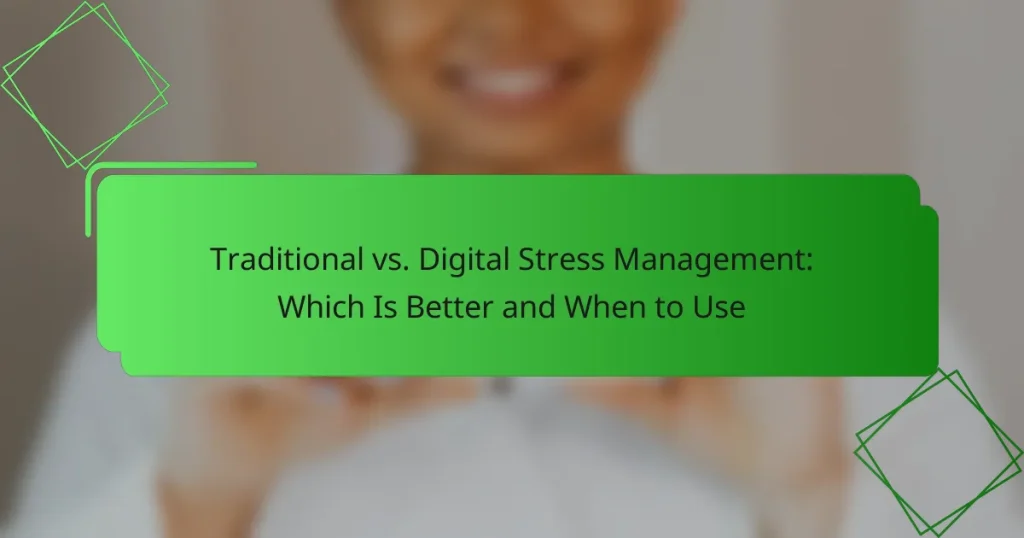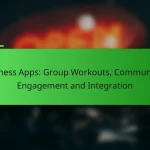In today’s fast-paced world, managing stress effectively is crucial for maintaining mental well-being. Traditional methods, such as therapy and group support, provide personalized strategies and emotional connections, while digital tools offer convenience and accessibility. Understanding when to use each approach can help individuals tailor their stress management techniques to fit their unique lifestyles and needs.
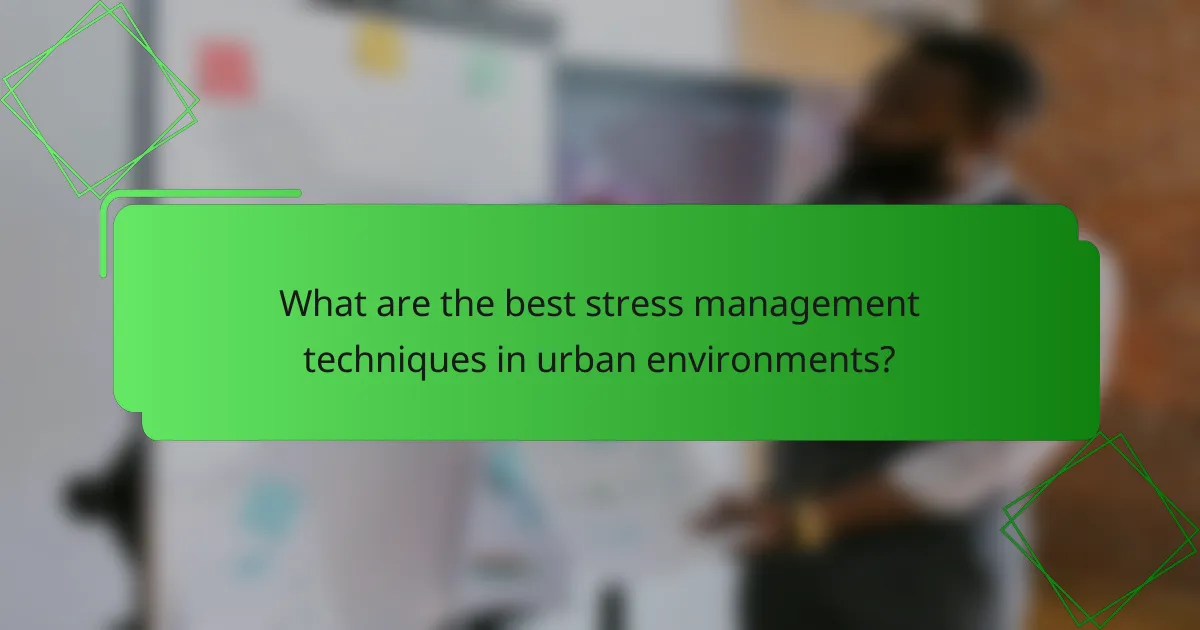
What are the best stress management techniques in urban environments?
In urban environments, effective stress management techniques include mindfulness meditation, yoga classes, digital therapy apps, breathing exercises, and physical fitness programs. Each method offers unique benefits and can be tailored to fit busy lifestyles, making them accessible for city dwellers.
Mindfulness meditation
Mindfulness meditation involves focusing on the present moment and accepting it without judgment. This practice can reduce stress by promoting relaxation and enhancing emotional regulation. Urban residents can start with just a few minutes a day, using guided sessions available through various apps.
To maximize benefits, find a quiet space and set a consistent time for practice. Consider joining local meditation groups for support and community, which can enhance motivation and accountability.
Yoga classes
Yoga classes combine physical postures, breathing exercises, and meditation to help alleviate stress. These classes are widely available in urban areas, catering to different skill levels and preferences. Regular participation can improve flexibility, strength, and mental clarity.
Look for classes that fit your schedule, whether they are in-person or online. Many studios offer introductory rates, making it easier to try different styles before committing to a long-term class.
Digital therapy apps
Digital therapy apps provide accessible mental health resources, including guided therapy sessions and stress management tools. These apps can be particularly beneficial for urban residents with busy schedules, as they allow for flexibility in when and where to engage with the material.
When choosing an app, consider those that offer evidence-based techniques and user-friendly interfaces. Many apps provide free trials, enabling users to explore their options before making a financial commitment.
Breathing exercises
Breathing exercises are simple yet effective techniques for managing stress. They can be performed anywhere and take only a few minutes, making them ideal for urban environments. Techniques such as deep breathing or the 4-7-8 method can quickly calm the mind and body.
To practice, find a comfortable position, inhale deeply for a count of four, hold for seven, and exhale for eight. Repeat several times to help reduce anxiety and promote relaxation.
Physical fitness programs
Physical fitness programs, including running, cycling, or group fitness classes, are excellent for reducing stress levels. Regular exercise releases endorphins, which improve mood and overall well-being. Urban areas often have numerous options, from gyms to outdoor fitness groups.
Set realistic fitness goals and choose activities you enjoy to maintain motivation. Consider joining local clubs or online communities to stay engaged and accountable in your fitness journey.
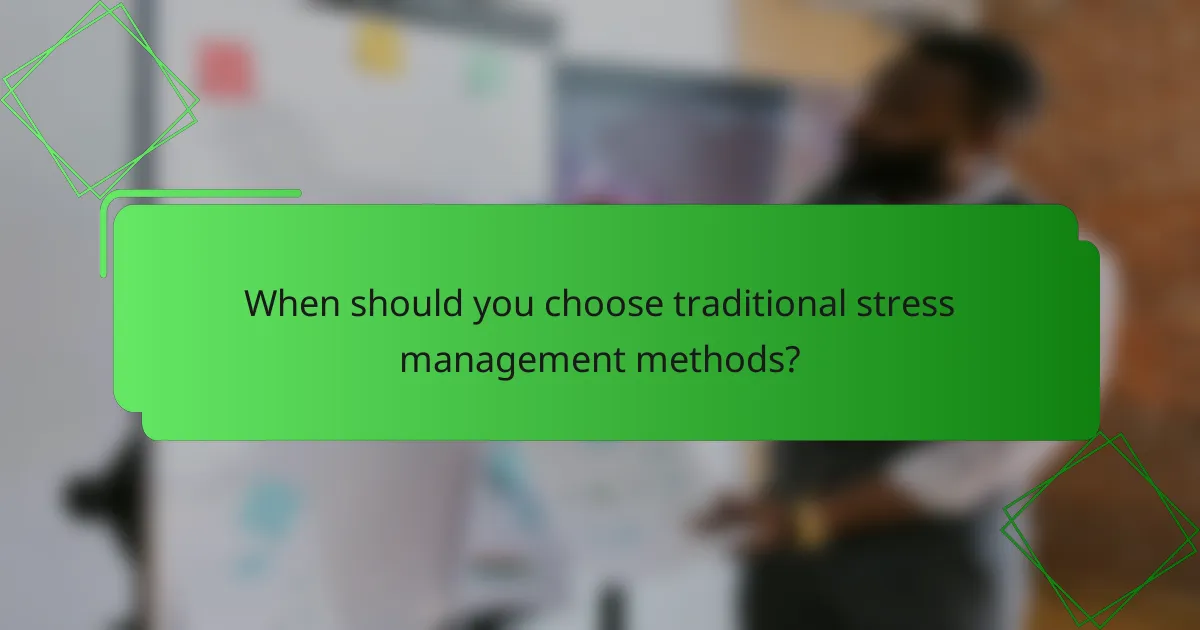
When should you choose traditional stress management methods?
Traditional stress management methods are best suited for individuals seeking long-term mental health support, personalized therapy, or group environments. These approaches often provide deeper emotional connections and tailored strategies that digital methods may lack.
Long-term mental health support
Traditional stress management techniques, such as psychotherapy and counseling, are designed for sustained mental health improvement. They allow for ongoing assessment and adaptation of strategies over time, which can be crucial for individuals dealing with chronic stress or anxiety.
Consider engaging in regular therapy sessions to build a strong foundation for mental resilience. This approach can help you develop coping mechanisms that are tailored to your specific needs and circumstances.
Personalized therapy sessions
In-person therapy offers a level of personalization that digital platforms often cannot match. Therapists can observe non-verbal cues and provide immediate feedback, which enhances the therapeutic experience.
When selecting a therapist, look for someone who specializes in your specific stressors. This ensures that the strategies discussed are relevant and effective for your unique situation.
Group support environments
Group therapy or support groups provide a communal space for sharing experiences and coping strategies. These environments foster a sense of belonging and understanding, which can significantly alleviate feelings of isolation associated with stress.
Participating in a group setting can also introduce you to diverse perspectives and coping techniques. Look for local support groups that align with your specific stress management needs, as they can offer valuable insights and encouragement.
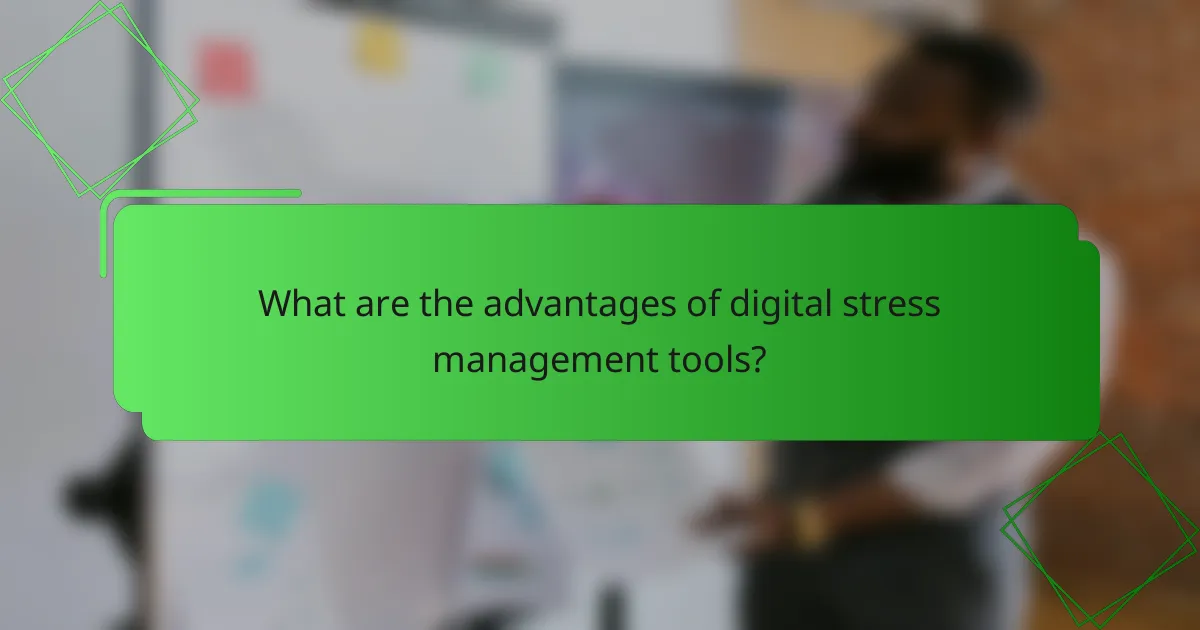
What are the advantages of digital stress management tools?
Digital stress management tools offer numerous advantages, including easy access and a variety of resources tailored to individual needs. They can enhance your ability to manage stress effectively and conveniently, often at a lower cost than traditional methods.
Accessibility and convenience
Digital stress management tools are accessible anytime and anywhere, making them ideal for busy lifestyles. Many apps and online platforms allow users to engage in stress-relief practices from the comfort of their homes or on the go.
This convenience means you can easily integrate stress management into your daily routine, whether through guided meditations, breathing exercises, or virtual therapy sessions. For example, a meditation app can provide a quick 5-minute session during a lunch break or a longer practice in the evening.
Cost-effectiveness
Many digital stress management tools are available at little to no cost, making them a budget-friendly option. Free apps and online resources often provide valuable content, while premium subscriptions typically range from low monthly fees to annual plans that are still less expensive than traditional therapy sessions.
For instance, a subscription to a mental wellness app might cost around $10 to $15 per month, compared to the average cost of a therapy session, which can be significantly higher. This affordability allows more people to access stress management resources.
Wide range of resources
Digital platforms offer a diverse array of resources, including videos, articles, and interactive tools tailored to various stress management techniques. Users can explore mindfulness, cognitive behavioral strategies, and relaxation exercises, all in one place.
This variety allows individuals to find the methods that resonate most with them, enhancing the effectiveness of their stress management efforts. For example, someone might prefer guided imagery while another finds journaling more beneficial, and both options are readily available online.
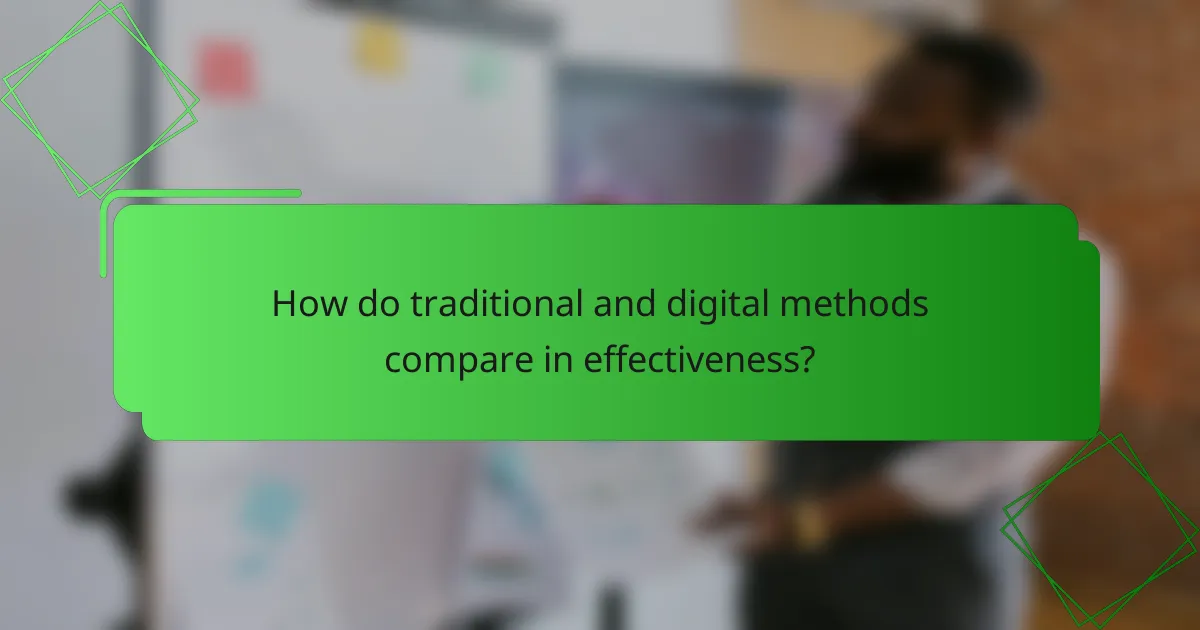
How do traditional and digital methods compare in effectiveness?
Traditional and digital stress management methods each have unique strengths and weaknesses in effectiveness. Traditional approaches often emphasize personal interaction and established practices, while digital methods leverage technology for convenience and accessibility.
Research on efficacy
Studies indicate that traditional stress management techniques, such as mindfulness meditation and yoga, can significantly reduce stress levels, often yielding immediate benefits. Digital methods, including apps and online therapy, have shown comparable results, particularly in terms of accessibility and user engagement.
However, the effectiveness of digital tools can vary widely based on user preferences and the specific features of the app or platform. Some research suggests that a blended approach, combining both traditional and digital methods, may offer the best outcomes for stress reduction.
User satisfaction rates
User satisfaction with traditional methods tends to be high due to the personal touch and community support often involved. Many individuals appreciate the face-to-face interaction and tailored guidance provided by therapists or instructors.
Long-term outcomes
Long-term outcomes for traditional stress management techniques often include sustained improvements in mental health and well-being, particularly when practices are maintained over time. Regular participation in classes or therapy can lead to lasting behavioral changes and coping strategies.
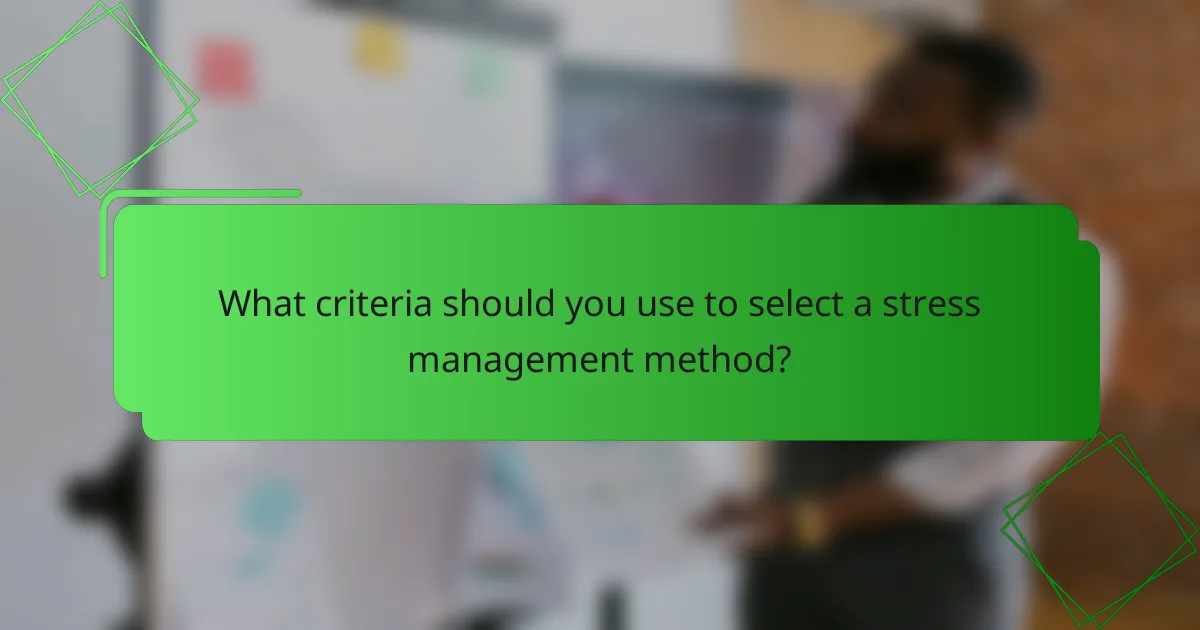
What criteria should you use to select a stress management method?
Selecting a stress management method depends on various criteria, including personal lifestyle, specific stress triggers, and preferred learning styles. Evaluating these factors can help you identify the most effective approach for your unique situation.
Personal lifestyle factors
Your daily routine, work schedule, and social commitments significantly influence your choice of stress management techniques. For instance, if you have a busy lifestyle, quick and accessible methods like mindfulness apps may be more suitable than time-consuming practices like yoga retreats.
Consider your physical environment as well. If you live in a noisy area, techniques that require quiet, such as meditation, may be challenging to implement. In such cases, exploring stress management methods that can be practiced in various settings, like breathing exercises, might be more effective.
Specific stress triggers
Identifying your specific stress triggers is crucial in selecting the right management method. For example, if work-related pressure is a primary source of stress, techniques like time management training or assertiveness training may be beneficial.
Conversely, if personal relationships are a significant stressor, engaging in communication skills workshops or seeking therapy could provide more targeted relief. Tailoring your approach to your unique triggers can enhance the effectiveness of your stress management efforts.
Preferred learning styles
Your preferred learning style plays a vital role in how you absorb and apply stress management techniques. If you are a visual learner, you might benefit from instructional videos or infographics that illustrate stress reduction strategies.
On the other hand, if you learn best through hands-on experience, participating in workshops or group classes may be more effective. Understanding your learning preferences can help you choose methods that resonate with you, making it easier to integrate them into your daily life.
